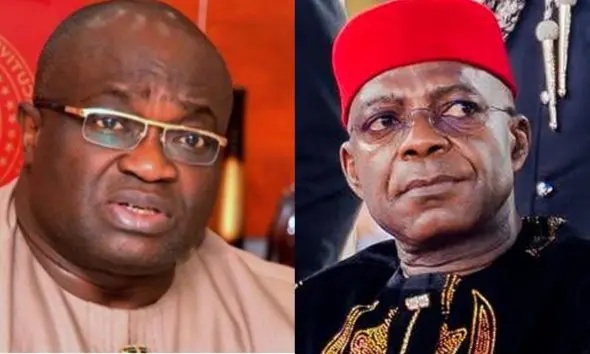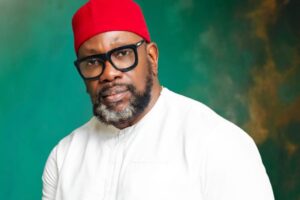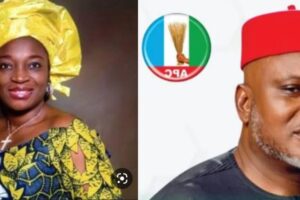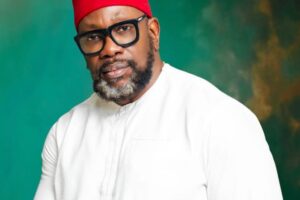
By Law Mefor
Nigerian politics is far too divisive and toxic. In addition to the toxicity, there is a pervasive self-fulfilling prophecy that holds that all public servants are corrupt. As a result, both elected and appointed public officials in the past and present are unfairly subjected to relentless media trials based on this assumption, usually on trumped charges.
This sets the scene for understanding the current media trial that Dr. Okezie Ikpeazu, the former governor of Abia State, is facing. Among other defamatory claims, his successor, Dr. Alex Otti, asserted that his predecessor had paid N10 billion for an Abia state airport that did not exist. Otti claimed to be quoting from a forensic audit report that he had ordered, though it hasn’t been released to the public or printed in a government gazette.
Otti appears to be acting like a magician, pulling what he pleases from the audit report—if it truly exists—and presenting it to the angry public, who act as juries and judges in media trials. The report is already accomplishing its goal of running Okezie Ikpeazu down.
However, it appears a boomerang is in the making. Otti’s credibility could be damaged, as will that of his young government, which many believe is off to a smooth start if the information he released against Ikpeazu and released to the public to facilitate a media trial turns out to be false. Nobody will ever believe Otti again, and that will be pathetic.
“Falsus in uno, falsus in omnibus” is a Latin aphorism that translates to “false in one thing, false in everything.” At common law, it is the legal principle that a witness who falsely testifies about one matter is not credible to testify about any matter. A witness who makes a false statement regarding one issue is not credible to testify about any other matter, according to common law.
The Stuart Treason Trials in the late seventeenth century are where the common law doctrines of “falsus in uno and falsus in omnibus” first appeared. The notion served as a required presumption that a witness was untrustworthy if they had previously lied in court.
English courts started advising juries way back in the nineteenth century that they could assume a witness who gave a false statement was not trustworthy. A required presumption of unreliability for witnesses or sources that have previously provided misleading testimony must also be upheld by discerning minds. A person must enter equity with clean hands.
Applied to the accusations made by the current governor of Abia State against his predecessor, whom he accused of embezzling N107 billion from the state during his tenure, including the assertion that Okpeazu spent a whooping N10 billion for an Abia state airport that never existed. Otti said his claim was the outcome of a report by one of the three best worldwide audit firms, as he defined them, which he said he commissioned to carry out a forensic audit as soon as he took office.
Ikpeazu’s aides and some informed Abians have dismissed Otti’s claim of Ikpeazu paying N10 billion for a nonexistent airport as a malicious fabrication, saying that no additional money was ever paid beyond the N10 million paid for the preliminary spade works, such as site identification, clearing, and the like. They posit that the project was halted because it was widely believed that an airport was not a priority for Abians at the time.
The forensic audit report has reportedly not yet been made public, despite attempts to obtain a copy of it. Subsequent inquiries have shown that the aforementioned audit report has not yet been formally presented to and approved by the Abia State Executive Council. Otti hasn’t even allowed his executive council to see it and is still keeping it close to his chest.
Furthermore, what is in the public domain points to the fact that the payment for a nonexistent Abia Airport used to stigmatise and mock the former governor, Ikpeazu, does not exist, just as the Abia State Airport does not exist either. So one might wonder why there is a rush to selectively release to the public portions of the audit report that is not yet been adopted.
The question is: Is Governor Otti simply trying to play politics with the public’s perception for optics’ sake, providing something for the media trial of his predecessor, and igniting a media frenzy? If Governor Otti did fabricate the N10 billion tales, he may have unintentionally destroyed any credibility that may have been in the forensic audit report since it is laced with lies that may have been injected to mask the truth.
It is right to state that Section 308 of the Constitution prevents Otti from being sued while he is in office for defamation. According to Section 308 of the Constitution, “no civil or criminal proceedings may be instituted against the President, Vice-President, Governor, or Deputy Governor, and they may not be arrested or imprisoned, nor may any process of any court requiring or compelling their appearance be issued against them.” So, Otti is safe.
However, Ikpeazu still has some recourse (after the harm he sustained is confirmed by Otti’s inability to substantiate his claim). Once the falsehood is confirmed, the audit report will be rendered meaningless, and the public will perceive it as more of a witch hunt than anything else.
When Nyesom Wike became the governor of Rivers State, a similar situation occurred there as well. He launched a comparable audit inquiry into the tenure of Chibuike Amaechi, his predecessor. Because the report was a witch hunt, it never saw the light of day. It was a precedent Otti should have been familiar with.
In particular, Otti should officially receive the report without further delay, have the Abia State Executive Council adopt it, and leave it available for public review as well as impartial, independent interrogation and investigation. If it is true that Otti did not fabricate at least some parts of the report to get media conviction against his predecessor, making the audit report available to the media shouldn’t be an issue at all. The fact that this procedure was the one that ought to have been followed also underlined the fact that Otti was essentially putting the cart before the horse when he released portions of the forensic audit report piecemeal, which many have trashed as untrue.
Ikpeazu’s experience demonstrates that the media trial of public officials in Nigeria has deep ramifications and implications for the battle against corruption. Even if the victims can prove their innocence, they are not granted real relief because the accusers never go back to debriefing the Nigerian public about the lies they peddled or offering an apology to the good Nigerians who have been maligned and falsely shown to other people as criminals.
In Ikpeazu’s case, Governor Otti must come clean by providing the media with proof of the funds made for the fictitious Abia State Airport, along with the name of the receiving firm or firms. If Ikpeazu never paid such money and there is no such evidence, Otti owes Ikpeazu a public apology.
The media should keep a close eye on this case, as it is a seriously developing story. Either Ikpeazu paid N10 billion for the airport or he did not, or Otti made up the tale or he did not.
As required by both the ethics of journalism and the law, the media should continue to hold public officials innocent until their guilt is proven by the courts and should assist in advocating for justice for those who have not been found guilty as charged. In addition, the media must continue to follow the two golden laws of journalism: hear the other side of the story and, when in doubt, leave out, while also conducting more in-depth investigations.
To determine if this is a case of falsus in uno or falsus in omnibus—”false in one thing, false in everything,” as many now suspect—Nigerians are waiting for the declassification of the Otti’s forensic audit report. He who alleges must prove.
Okezie Ikpeazu should take turns laughing last and should have his integrity back if indeed the phantom airport payment is a fabrication and politics.
*Dr. Law Mefor, an Abuja-based forensic and social psychologist, is a fellow of The Abuja School of Social and Political Thought; drlawmefor@gmail.com; Twitter:




